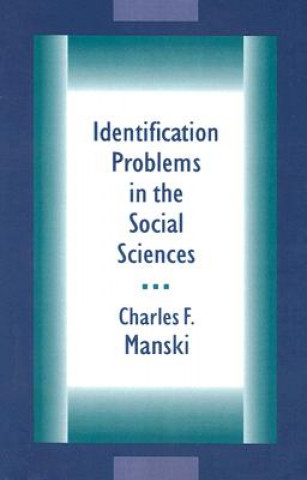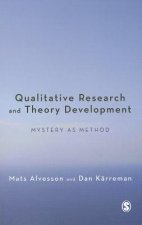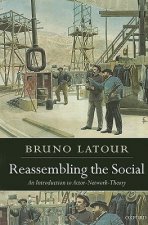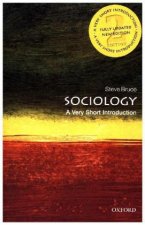
Code: 04636122
Identification Problems in the Social Sciences
by Charles F. Manski
This text provides a language and a set of tools for finding bounds on the predictions that social and behavioural scientists can logically make from non-experimental and experimental data. Economist Charles Manski draws on exampl ... more
- Language:
 English
English - Binding: Paperback
- Number of pages: 194
Publisher: Harvard University Press, 2019
- More about this

You might also like
-

Hearing Gesture
36.03 € -

Alan Moorehead
20.01 € -13 % -

Interpretation of St. Matthew's Gospel, Chapters 1-14
66.73 € -

Novel Living
21.86 € -

Red, Red Rose
5.23 € -14 % -

To Baby With Love
17.96 € -

Particle Interactions at Very High Energies
71.04 €
Give this book as a present today
- Order book and choose Gift Order.
- We will send you book gift voucher at once. You can give it out to anyone.
- Book will be send to donee, nothing more to care about.
More about Identification Problems in the Social Sciences
You get 140 loyalty points
 Book synopsis
Book synopsis
This text provides a language and a set of tools for finding bounds on the predictions that social and behavioural scientists can logically make from non-experimental and experimental data. Economist Charles Manski draws on examples from criminology, demography, epidemiology, social psychology and sociology as well as economics to illustrate this language and to demonstrate the broad usefulness of the tools. There are many traditional ways to present identification problems in econometrics, sociology and psychometrics. Some of these are primarily statistical in nature, using concepts such as flat likelihood functions and non-distinct parameter estimates. Manski's strategy is to divorce identification from purely statistical concepts and to present the logic of identification analysis in ways that are accessible to a wide audience in the social and behavioural sciences. In each case problems are motivated by real examples with real policy importance, the mathematics is kept to a minimum, and the deductions on identifiability are derived providing fresh insights. Manski begins with the conceptual problem of extrapolating predictions from one population to some new population or to the future. He then analyzes the fundamental selection problem that arises whenever a scientist tries to predict the effects of treatments on outcomes. He specifies assumptions and develops his non-parametric methods of bounding predictions. Manski shows how these tools should be used to investigate common problems such as predicting the effect of family structure on children's outcomes and the effect of policing on crime rates. Successive chapters deal with topics such as the use of experiments to evaluate social programmes, the use of case-control sampling by epidemiologists studying the association of risk factors and disease and the use of intentions data by demographers seeking to predict future fertility. The book closes by examining two central identification problems in the analysis of social interactions: the classical simultaneity problem of econometrics and the reflection problem faced in analyses of neighbourhood and contextual effects.
 Book details
Book details
Book category Knihy po anglicky Society & social sciences Sociology & anthropology Sociology
56.87 €
- Full title: Identification Problems in the Social Sciences
- Author: Charles F. Manski
- Language:
 English
English - Binding: Paperback
- Number of pages: 194
- EAN: 9780674442849
- ISBN: 0674442849
- ID: 04636122
- Publisher: Harvard University Press
- Weight: 292 g
- Dimensions: 222 × 143 × 12 mm
- Date of publishing: 29. May 2019
Trending among others
-

NINETY PERCENT OF EVERYTHING
18.68 € -6 % -

Social Change in a Peripheral Society
33.67 € -

Fair Play Deck
20.53 € -9 % -

Tragedy and Hope
44.65 € -

Sex at Dawn
13.75 € -21 % -

Regretting Motherhood
15.80 € -9 % -

Theory of the Leisure Class
12.31 € -23 % -

Book of Tea
10.16 € -22 % -

Social Intelligence
12.93 € -24 % -

Bushido the Soul of Japan
11.49 € -

Eroticism
12.31 € -23 % -

Surrendered Wife
11.18 € -23 % -

World of Sex
6.87 € -23 % -

Tragedy and Hope
71.35 € -

World-Systems Analysis
21.96 € -13 % -

Cruel Optimism
27.82 € -6 % -

Critique of Everyday Life
37.47 € -19 % -

Studies on the Abuse & Decline of Reason
18.57 € -

Post-Adoption Blues
18.78 € -

Blueprint for Revolution
10.98 € -24 % -

Wanderlust
17.03 € -20 % -

Dying for Ideas
13.54 € -10 % -

Qualitative Research and Theory Development
45.99 € -9 % -

Treatise on the Family
73.40 € -

From Benito Mussolini to Hugo Chavez
47.02 € -

Return to Meaning
56.46 € -

Being Mortal
19.81 € -9 % -

Marriageology
25.86 € -5 % -

Intimate Communion
13.85 € -20 % -

Cartoon Guide to Statistics
19.60 € -16 % -

Small Is Beautiful
11.18 € -23 % -

More Than Two
30.79 € -2 % -

Being Mortal
13.85 € -1 % -

True Believer
14.26 € -23 % -

Art of Community: Seven Principles for Belonging
19.29 € -21 % -

Marriage, a History
18.57 € -13 % -

Gifts of Imperfection: 10th Anniversary Edition
28.84 € -

Why Love Hurts - A Sociological Explanation
18.68 € -

Past Mortems
10.16 € -22 % -

Population Control
14.47 € -23 % -

Reassembling the Social
53.49 € -

Class Ceiling
13.13 € -10 % -

Chrysanthemum and the Sword
18.99 € -

Family and Civilization
22.99 € -6 % -

Braving the Wilderness
8.72 € -21 % -

Intercourse
15.49 € -23 % -

Sociology: A Very Short Introduction
10.16 € -22 % -

Death and the Afterlife
18.88 € -22 % -

Social Construction of Reality
12.31 € -23 %
Osobný odber Bratislava a 2642 dalších
Copyright ©2008-24 najlacnejsie-knihy.sk Všetky práva vyhradenéSúkromieCookies



 21 miliónov titulov
21 miliónov titulov Vrátenie do mesiaca
Vrátenie do mesiaca 02/210 210 99 (8-15.30h)
02/210 210 99 (8-15.30h)